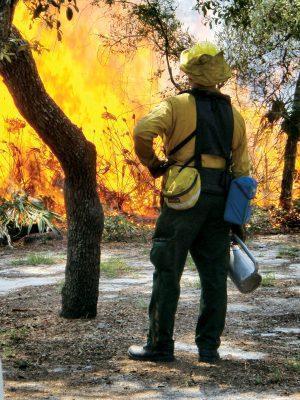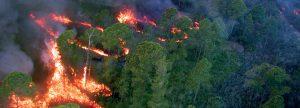
Language once seemed the most obvious ability that set humans apart from other species. But as we study the intricacies of communication in species other than our own, we learn that complex communication is not unique to humans. Opposable thumb aside, what does set humans dramatically apart from other species is our ability to control fire.
Fire is a land management tool used on many public lands to improve wildlife habitat, enhance forest health, and prevent wildfire. Because lightning does not always strike at our convenience, land managers have learned to conjure and control its consequences—fire.
Many of Florida’s natural systems are fire dependent. Flatwoods, pine sandhills, and sand pine/scrub oak communities—and the wildlife within them—need fire to remain healthy. In Florida’s state parks, fire dependent systems shelter many threatened and endangered plant and animal species—the black bear, the scrub jay, the indigo snake, the gopher tortoise, and the scrub holly. Fire is essential to the health of systems adapted to periodic fire.
Fire improves foliage by stimulating new growth of herbaceous species, which provides a nutritious salad bar for wildlife. Fire reduces the height of vegetation to a level suitable for the scrub jay and other small wildlife. Fire creates openings in the forest where improved visibility provides predators with access to lunch. Many species use ash as a mineral source.
Fire exposes the mineral soil of the forest floor and controls competing vegetation, which allows seedlings to establish. Fire helps control insects and diseases that affect pines. Fire recycles nutrients through the ecosystem.

As we depend on our ability to light a fire, we also depend on our ability to extinguish a fire. Prescribed burns reduce fuel—underbrush and deadfall—that builds up on a forest floor. If fuels are not reduced periodically, wildfires can become intense and destructive. Prescribed burns are set so that when lightening does strike, we can more easily extinguish fires that threaten property or lives.
Any prescription for fire takes into consideration fuel type, fuel moisture, relative humidity, air temperature, wind speed, and wind direction. Prescribed fires are planned, set, and extinguished by trained professionals under permits issued by the Florida Forest Service. The Florida Department of Environmental Protection keeps natural communities in many state parks and other state lands thriving with one of humans’ most useful accomplishments—the ability to set a fire. ![]()
By Cherie Graves
Florida Department of Environmental Protection




